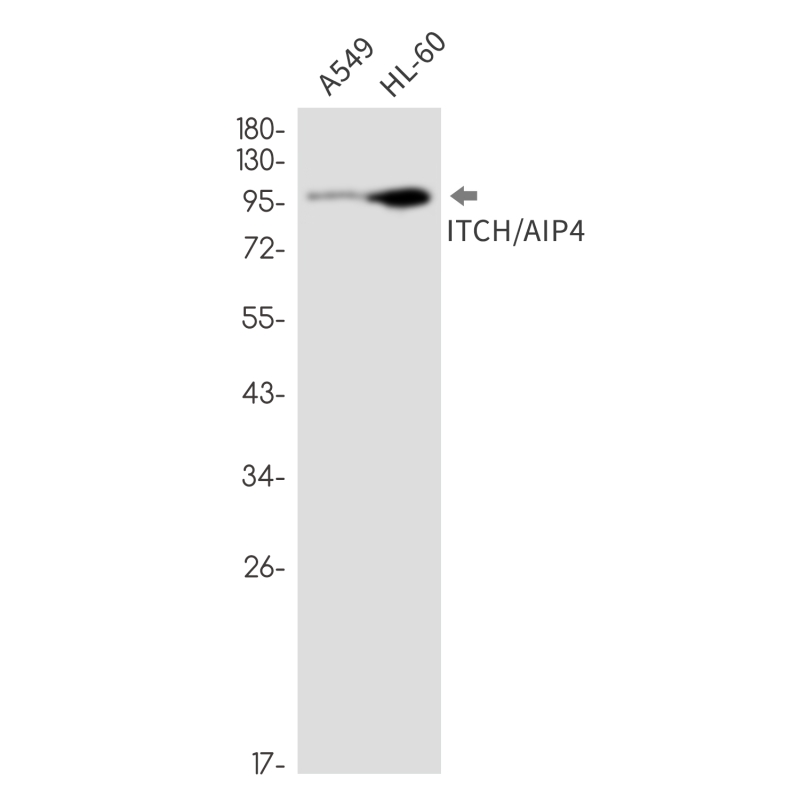
| WB | 1/500-1/1000 | Human,Mouse,Rat |
| IF | 咨询技术 | Human,Mouse,Rat |
| IHC | 咨询技术 | Human,Mouse,Rat |
| ICC | 技术咨询 | Human,Mouse,Rat |
| FCM | 咨询技术 | Human,Mouse,Rat |
| Elisa | 咨询技术 | Human,Mouse,Rat |
| Aliases | ITCH; E3 ubiquitin-protein ligase Itchy homolog; Itch; Atrophin-1-interacting protein 4; AIP4; NFE2-associated polypeptide 1; NAPP1 |
| Entrez GeneID | 83737 |
| WB Predicted band size | Calculated MW: 103 kDa; Observed MW: 103 kDa |
| Host/Isotype | Rabbit IgG |
| Antibody Type | Primary antibody |
| Storage | Store at 4°C short term. Aliquot and store at -20°C long term. Avoid freeze/thaw cycles. |
| Species Reactivity | Human |
| Immunogen | A synthetic peptide of human ITCH/AIP4 |
| Formulation | Purified antibody in TBS with 0.05% sodium azide,0.05%BSA and 50% glycerol. |
+ +
以下是关于ITCH抗体的3篇参考文献,简要列举如下:
---
1. **文献名称**: *"The E3 ubiquitin ligase Itch regulates expression of transcription factor Foxp3 and airway inflammation by enhancing the function of transcription factor TIEG1"*
**作者**: Venuprasad K., Elly C., Yang C., et al.
**摘要**: 研究探讨ITCH通过泛素化调控Foxp3表达,影响Treg细胞功能及呼吸道炎症。文中使用抗ITCH抗体进行免疫共沉淀,验证ITCH与TIEG1的相互作用,揭示其在免疫调节中的关键作用。
---
2. **文献名称**: *"ITCH K63-ubiquitinates the NOD2 binding protein, RIP2. to influence inflammatory signaling pathways"*
**作者**: Tao M., Scacheri PC., Marinis JM., et al.
**摘要**: 本文发现ITCH通过K63泛素化修饰RIP2蛋白,调控NOD2信号通路。研究利用ITCH特异性抗体进行Western blot和免疫荧光实验,证实ITCH在炎症反应中的负向调控机制。
---
3. **文献名称**: *"Defective ubiquitin-mediated degradation of antiapoptotic Bcl-2 predisposes to lymphoma"*
**作者**: Rossi M., Aqeilan RI., Neale M., et al.
**摘要**: 研究揭示ITCH介导Bcl-2蛋白的泛素化降解异常与淋巴瘤发生相关。通过抗ITCH抗体检测患者样本中ITCH表达水平,证明其作为肿瘤抑制因子的潜在临床意义。
---
**备注**:以上文献均涉及ITCH抗体的实验应用(如Western blot、免疫沉淀等),并聚焦于ITCH在泛素化、免疫调控及疾病中的作用。如需具体实验细节或抗体货号,建议查阅原文方法部分。
The ITCH antibody is a crucial tool in studying the ITCH protein, an E3 ubiquitin ligase belonging to the HECT (Homologous to E6-AP C-Terminus) family. ITCH plays a pivotal role in the ubiquitin-proteasome system, tagging target proteins for degradation and regulating diverse cellular processes, including immune response, apoptosis, and cell cycle control. It is implicated in modulating key signaling pathways, such as NF-κB, Notch, and Wnt, by ubiquitinating substrates like Jun, p63. and c-FLIP. Dysregulation of ITCH is linked to autoimmune diseases, cancer, and neurological disorders, making it a focus of therapeutic research.
ITCH antibodies are widely used in biomedical research to detect ITCH expression levels, localization, and interactions via techniques like Western blotting, immunohistochemistry, and co-immunoprecipitation. These antibodies help elucidate ITCH's role in protein homeostasis and disease mechanisms. For instance, studies using ITCH-deficient models highlight its regulatory function in T-cell activation and inflammation, underscoring its relevance in autoimmune conditions. Additionally, ITCH antibodies aid in exploring its tumor-suppressive or oncogenic roles, depending on cellular context.
As research advances, ITCH antibodies remain essential for unraveling the complexity of ubiquitination networks and developing targeted therapies. Their specificity and reliability are critical for validating experimental findings and translating insights into clinical applications.
×